One of the most biologically diverse places out there! Past Review
By A student (Weber State University) - abroad from 06/20/2016 to 08/02/2016 with
Round River Conservation Studies: Costa Rica – The Osa Peninsula
I gained life experience, knowledge, patience, and a better appreciation for the natural world. I was into conservation before I left, but now I am obsessed. I truly feel like I came back a different person and I still can't believe I was able to be a part of this amazing opportunity. It was 100% worthwhile, I would do it all over again.
Review Photos
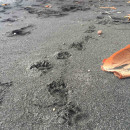
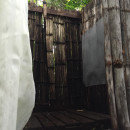
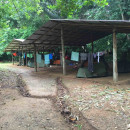
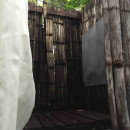
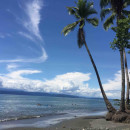
Personal Information
| How much international exposure did you have prior to this program? | 0-2 weeks |
Review Your Program
|
* Overall educational experience
Academic rigor, intensity, resources, etc. |
The academics took up slightly more time during the program than I anticipated but it really helped accelerate the learning process in such a short amount of time. The academics are fast paced, touching on many different topics. |
|
* Host Country Program Administration
On-site administration of your program |
|
|
* Housing:
How satisfied were you with your living arrangements? |
We stayed in a hotel for 3-5 nights out of the six weeks, 3-4 nights in bunk houses and the rest of the time on our sleeping pads either in our tents or netted in platforms. It rains a lot, especially from June-August, so anywhere we stayed we were on covered platforms. |
| * Food: |
We bought, prepared and cooked all of our own food on a couple different types of stoves (camp stoves). I would say we had some great cooks in our group, so that made our food great! Common things we ate: pasta, rice, beans, sandwiches, cookies, vegetables, fruit, nuts, oatmeal, coffee, tea, arepas, tortillas, lentils, hot sauce, fried cheese, occasionally meat. |
|
* Social & Cultural Integration:
How integrated did you feel with the local culture? |
We got to make some great friendships/partnerships with the locals living on the Osa Peninsula. We were invited to dinner on many occasions to their homes and to birthday parties and other celebrations. Three of my favorite things from this was the latin dancing, the food and getting to talk about the culture with the locals. |
|
* Health Care:
How well were health issues addressed during the program? |
The instructors are very knowledgable and trained for these types of circumstances. They were able to go into town for many different types of medications/prescriptions. We also had access to the doctors on-call through global rescue (although we never needed to use them). You need to get vaccinated for typhoid fever before going and there are some concerns of the zika virus. I was not concerned about the zika virus and there hadn't been any cases on the Osa when I went. If you are worried, just make sure to bring bug repellent. Travelers diarrhea is very possible, but easy to treat. |
| * Safety: |
The only thing to be worried about is theft (like many other places) and snakes. I never felt unsafe. The instructors and hosts do a really good job with making sure safety is the number one priority. As far as snakes goes, wear your knee high rubber boots and keep your eyes on the trail. |
| If you could do it all over again would you choose the same program? |
Yes
We were absolutely spoiled by diversity. I met so many new species and came to understand some of them very intimately. I learned so much about myself and the world around me. I got 9 upper division credits while hanging out in the jungle, and the cherry on top, we are working toward conserving this incredible paradise. |
Finances
|
* Money: How easily were you able to live on a student's budget?
(1 = not very easy/$200+ on food & personal expenses/week, 2.5 = $100/week, 5 = very easily/minimal cost) |
The program itself is pretty expensive, so it covered everything. The only time you ever needed your own money was traveling to Costa Rica, out of Costa Rica, souvenirs, and any other personal expenses. |
| Not including program expenses, about how much money did you spend on food and other expenses each week? | 0-$10 |
| Do you have any general money-saving tips for future study abroad participants? | You shouldn't need to spend hardly any of your money after you have paid for the program itself. I think what some other students spent the majority of their money on was alcohol. |
Language
| * Did your program have a foreign language component? | Yes |
|
How much did the program encourage you to use the language?
0 = No encouragement, 5 = frequent encouragement to use the language |
Spanish was NOT required but we got some opportunities to use it. |
| How would you rate your language skills at the beginning of the program? | Beginner |
| How would you rate your language skills at the end of the program? | Intermediate |
| What was the highest level language course you had completed prior to departure? | 3 years |
| How many hours per day did you use the language? | |
| Do you have any tips/advice on the best ways to practice the language for future study abroad participants? | If you want to practice Spanish while you are in Costa Rica I would recommend brushing up on it a little before you go. Maybe look over basic conversations in everyday life (getting around town, getting to know people, ordering food, etc.) and maybe learn some scientific words as well. If you want to become better at the language you really have to apply yourself and make an effort since it isn't apart of the curriculum, definitely doable. |
Other Program Information
|
* Where did you live?
Select all that apply |
|
|
* Who did you live with?
Select all that apply |
|
|
* Who did you take classes with?
Select all that apply |
|
| About how many local friends did you make that you will likely keep in touch with? |
A Look Back
| * What did you like most about the program? |
|
| * What could be improved? |
|
| * What do you know now that you wish you knew before going on this program? | Nothing every dries in the rainforest. Things start to mold quickly. Take quick dry, moisture wicking everything. Don't take hiking boots, you won't use them (we always used our knee high rubber boots). It's okay to bring fun stuff too (games, instruments, fun lights). You are dependent on head lamps/flash lights A LOT! |
Reasons For Studying Abroad
| To help future students find programs attended by like-minded individuals, please choose the profile that most closely represents you. |
The Avid AdventurerThe wardrobe you packed was better suited for a semester of camping than club hopping. Outdoorsy, you might forgo a crazy night out for an early all-day adventure. You'd rather take in the rich culture of an old town than the metropolis of a modern city, but for you getting off the grid is ideal. |
Individual Course Reviews
| Course Name/Rating: |
Natural History of Costa Rica |
| Course Department: | |
| Instructor: | |
| Instruction Language: | English |
| Comments: | There were four main criteria we were graded on: 1. Grinnell Journal and Species Accounts, 2. Participation in reading discussions/lectures/guest lectures, 3. Blog entry, 4. Practicum exam (flora/fauna identification). The most time consuming were the Grinnells and Species Accounts. There was one practice Grinnell and two real Grinnells and two Species Accounts. The most 'difficult' would probably be the practicum exam, but as long as you pay attention while in the field and take notes about the different species you learn about, you'll do great! I personally thought the Grinnells and Species Accounts took away from the experience at times because it was so time consuming to do and time consuming to grade. The instructors are VERY knowledgable, we would often refer to them as our google in the jungle. This class was fairly graded. |
| Credit Transfer Issues: |
| Course Name/Rating: |
Applied Conservation Biology |
| Course Department: | |
| Instructor: | |
| Instruction Language: | English |
| Comments: | Final grades were based on the following: 1. Problem set, 2. Discussion facilitation and participation, 3. Final exam, 4. Final essay. The problem set is basically an essay question that incorporates many aspects/topics from the semester. There were a lot of readings for this course, that is where the discussion facilitation and participation comes in. The final exam was the most 'exam' like thing we did. This was also the hardest final of the program. I think with a better outline of expectations this will be better in the future. The final essay was a 'take home' essay where they gave a prompt related to experiences during the program and they gave 4-5 hours to complete. I think that most of the learning for all of these courses was accomplished in the field. |
| Credit Transfer Issues: |
| Course Name/Rating: |
Introduction to Biological Field Methods |
| Course Department: | |
| Instructor: | |
| Instruction Language: | English |
| Comments: | Final grades were based on the following: 1. Participation in field research, 2. Final research report, 3. Field methods quiz. The hardest, most time consuming thing for this course was the Final research report, but was also the coolest! We each chose one of the research projects we were working on to write a research report on (sometimes more than one student worked on each project). All of these courses were conducted at the field camps and we did a lot of learning while in the field. |
| Credit Transfer Issues: |








